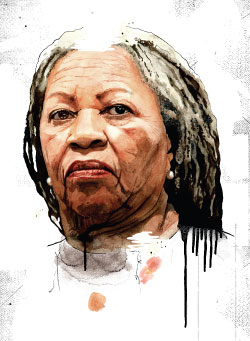
Those millions of readers familiar with Toni Morrison’s work, in particular her novel Beloved, won’t be surprised at the numerous instances of brutality and deprivation in her new book, A Mercy, the Nobel Prize winner’s ninth novel and her first since Beloved to depict American slavery—albeit in a very early, seventeenth-century form. What may well throw them for a loop is the redemptive tone: a pristine landscape, a compassionate white Northern farmer, and a notable absence of racial animosity—felt even more keenly in an election year with a full deck of race cards. In A Mercy, Jacob Vaark’s collection of laborer-charges (a Native American, a black child, an orphan, and two indentured servants) are united by and against a spreading culture of servitude that has little to do with skin color.
“I really wanted to get to a place before slavery was equated with race,” says Morrison. “Whether they were black or white was less important than what they owned and what their power was.” She speaks from her home on the Hudson River in Rockland County, as an “inconvenient but exciting” summer thunderstorm rages outside. At 77 and preparing for her last year of teaching at Princeton, she has a high, soft, almost timid voice—perhaps the result of having just recorded the audio version of A Mercy (“three days of complete misery”). But her stated purpose—defining an America where race isn’t everything—couldn’t be clearer: “There is no civilization that did not rest on unpaid labor—not Athens, not Russia, not England, no one,” she says. “The exoticism came with race.”
Just before Super Tuesday, Morrison—who famously called Bill Clinton “the first black president”—wrote an open letter to Barack Obama, in which she praised him for “a creative imagination” that “coupled with brilliance equals wisdom.” She also wrote, “nor do I care very much for your race[s].” And of all the talking points on which she agrees with the first actually black presidential nominee, the most intriguing is affirmative action. “The fact that we have labeled affirmative action as a black thing is an enormous error,” she says. “The problems are about poor people—that’s it.”
Yet none of this is to say that Morrison thinks race has run its course as an American topic (even if Obama wins). “Crude and crass as most of it is and, really, uninformed as almost all of it is, the discourse about race is important,” she says. “But the real conversation should take place among white people. They should talk to each other about that. Not with me. I can’t be the doctor and the patient.”
A Mercy
Knopf. November 11.
